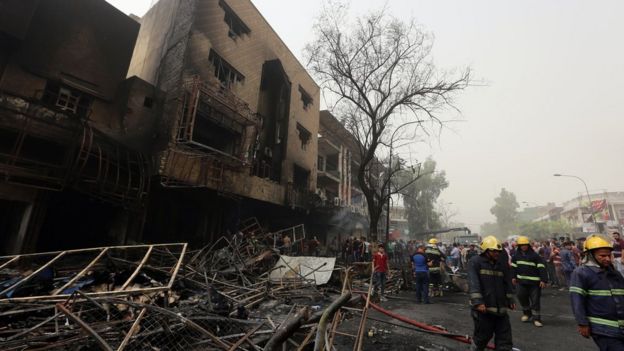by PATRICK COCKBURN
 Buildings at the scene of the blast were badly charred and damaged PHOTO/BBC
Buildings at the scene of the blast were badly charred and damaged PHOTO/BBC
I started working as a journalist at the height of the troubles in Northern Ireland, between 1972 and 1975, and then moved to Lebanon where the 15-year-long civil war was just beginning. I saw both countries as interesting but bloody and atypical, sad casualties of their divisive histories and out of keeping with the modern world.
Unfortunately, over the following 40 years it turned out that the Lebanese war was a foretaste of the violent sectarian, ethnic and social divisions that were to tear the Middle East apart. Nation states ruled by despots became more politically fragile by the year and foreign powers exacerbated civil wars by military intervention and by backing their local proxies. Extreme Islam flourished in conditions of chaos, replacing nationalism and socialism as the ideological vehicle for opposition to the status quo.
Just how Britain plunged into this morass without much idea of the dangers it was running should be illuminated at great length by the Chilcot Report when it is published next Wednesday, but the risks involved were obvious from the beginning.
Analogies between the break-up of Lebanon into warring factions, which I witnessed when I first arrived, and the disintegration of the Middle East today are clear cut and undeniable. There are currently at least seven wars and three serious insurgencies raging in the countries between Pakistan and Nigeria, with no signs of those conflicts ending. Over the years,
I periodically wrote doleful warnings about how the disintegration of Lebanon and Iraq, disasters that had once seemed to me to be so out of the ordinary, were spreading to neighbouring states and becoming the new norm.
By the way of contrast, Northern Ireland seldom provided useful parallels with developments in the rest of Britain or Western Europe; its violence and sectarian divisions made it feel more like a chunk of the Balkans that had accidentally lodged on the shores of the Atlantic.
It is only in the last couple of years that I began to notice similarities in tone and substance between Northern Ireland as I knew it in the 1970s and British politics today. The referendum on Scottish independence in 2014 and the electoral triumph of the Scottish Nationalist Party the following year, put the legitimacy and integrity of the British state in doubt on the mainland, with the same destabilising effect as it had always had in Northern Ireland. Equally disturbing was the way in which immigration moved to the centre of the political stage during the Brexit campaign.
One always knew that there were deep wells of xenophobia in England, but what was different about the last few months, and reminiscent of Northern Ireland, was the way in which mainstream politicians tolerated or promoted a racist message as their main instrument for mobilizing voters. British politicians once “played the Orange card” in Ireland with toxic results for its people; now they are playing “the immigrant card” at home with equally explosive potential.
I have always been suspicious of what I used to deride as “the department of shallow analogies” between superficially similar, but in reality very different, situations in different countries. I remember how much it used to annoy me when I was a correspondent in Moscow in the 1980s and visitors would assure me that the Soviet Union was just like South Africa, or some other country with which they were familiar.
Counterpunch for more
